Thanksgiving Safety Tips
11/21/2019 (Permalink)
For most, the kitchen is the heart of the home, especially during the holidays. From testing family recipes to decorating cakes and cookies, everyone enjoys being part of the preparations.So keeping fire safety top of mind in the kitchen during this joyous but hectic time is important, especially when there’s a lot of activity and people at home. As you start preparing your holiday schedule and organizing that large family feast, remember, by following a few simple safety tips you can enjoy time with your loved ones and keep yourself and your family safer from fire.
Top 10 safety tips
- Stay in the kitchen when you are cooking on the stove top so you can keep an eye on the food.
- Stay in the home when cooking your turkey, and check on it frequently.
- Keep children away from the stove. The stove will be hot and kids should stay three feet away.
- Make sure kids stay away from hot food and liquids. The steam or splash from vegetables, gravy or coffee could cause serious burns.
- Keep knives out of the reach of children.
- Be sure electric cords from an electric knife, coffee maker, plate warmer or mixer are not dangling off the counter within easy reach of a child.
- Keep matches and utility lighters out of the reach of children — up high in a locked cabinet.
- Never leave children alone in room with a lit candle.
- Keep the floor clear so you don’t trip over kids, toys, pocketbooks or bags.
- Make sure your smoke alarms are working. Test them by pushing the test button.
Thanksgiving fire facts
- Thanksgiving is the peak day for home cooking fires, followed by Christmas Day, Christmas Eve, and the day before Thanksgiving.
- In 2017, U.S. fire departments responded to an estimated 1,600 home cooking fires on Thanksgiving, the peak day for such fires.
- Unattended cooking was by far the leading contributing factor in cooking fires and fire deaths.
- Cooking equipment was involved in almost half of all reported home fires and home fire injuries, and it is the second leading cause of home fire deaths.
Source: NFPA's Fire Applied Research Division






 24/7 Emergency Service
24/7 Emergency Service
